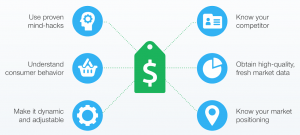How Artificial Intelligence is Regulating Live Video Streams

It’s possible that you may have already come across Artificial Intelligence (AI) at some point in your life without even realizing it. For example, Facebook, Twitter, and Google all use AI to ensure that users have a seamless experience on their platforms, whether by automatically tagging friends in photos or providing results based on previous searches.
These uses of AI are relatively simple and only involve one part of the technology – Machine Learning (ML). Fundamentally, ML is becoming more prevalent, but what about its big brother and sister, Deep Learning (DL), and narrow Artificial Intelligence? How can these potentially create streaming services that we will never want to live without?
Artificial Intelligence vs. Machine Learning vs. Deep Learning
Artificial intelligence (AI) is a field that has become increasingly popular in recent years. The field itself is vast and covers a variety of topics. The general idea for AI is that computers perform tasks that typically require human intelligence. Such as visual perception and language processing.
Machine learning is one of the most common uses of Artificial Intelligence solutions today. It involves training an algorithm with large sets of data and applied to new data. For example, machine learning algorithms are used for tasks like facial recognition, spam filtering, and language translation.
Machine learning is a subset of artificial intelligence that makes computers learn from data even if not explicitly programmed. It is a branch of artificial intelligence. Focused on developing computer programs that learn when exposed to new data. Machine learning is used to develop programs capable of making their own decisions without human intervention.
Machine learning underpins many services and products, including search engines and social media platforms. Many financial institutions use machine learning to monitor customer account activities for fraud or other irregularities.
Artificial Intelligence Solutions Making Video Streaming Personalized for Users
AI has been used for many years, but more recently, it has come into the spotlight thanks to a number of developments from both large technology companies and smaller startups. One application that has garnered much attention is personalization.
For the uninitiated, artificial intelligence (AI) refers to computer programs designed to perform tasks associated with human intelligence. The term covers a wide range of applications, including voice recognition and content filtering. AI is also sometimes used as a synonym for machine learning (ML) or deep learning (DL). Tasks that can be accomplished with Artificial Intelligence include image recognition and language processing — identifying objects in photos and translating text from one language to another, respectively.
The Artificial Intelligence hype cycle has been building steam for decades. But today’s technology is finally catching up with the hype, thanks in large part to advances in machine learning algorithms — the driving force behind technologies like speech recognition, natural language processing, self-driving cars, and other applications of AI.
Why Live Streaming Needs Artificial Intelligence (AI)
The number of people watching live streaming is growing rapidly worldwide, and AI will play a vital role in the future development of live streaming. Let’s take a look at this.
Live streaming has become a powerful tool for communication and entertainment. It seems to be “the new way to communicate” after email, messaging, SMS, and WeChat.
It seems that every one of us loves watching live streaming of sports events, concerts, award ceremonies, and so on. This kind of live streaming attracts us because it provides us with more real-time information than other media do. Besides, the performers or players always give us an impressive show or performance via live streaming.
AI Does More Than Just Live Streaming
On the other hand, AI technology is also developing rapidly nowadays. Especially AI algorithms have significant applications in many fields such as marketing, finance, education, medicine, etc. Moreover, artificial intelligence has become indispensable for unmanned vehicles such as cars, guided missiles, and drones to make decisions independently without human control.
The process involves using real-time video as opposed to pre-recorded videos or images. What makes live streaming different from other video-sharing services is that the recording is being done in a single take. You don’t need to edit it at all; what you record is what you get.
Can I use artificial intelligence (AI) to make my live streaming more effective?
The answer is yes. Here are some of the ways:
#1 Artificial intelligence can provide live analytics for better performance – AI can help provide data on how people respond to your live stream. This can help you improve your content and overall live stream performance.
#2 With AI, content discovery becomes easier – If you are using social media sites like Twitter and Facebook for promotion, artificial intelligence can help you find the best time to post your content so that more users will be able to see it
#3 Content Indexing to Improve User Experience- ByteDance, the parent company of TikTok, has found a way to integrate AI with human curation to enhance video content cataloging, thus providing an even better experience for its users. TikTok, which lets users create short videos that can be shared with friends or posted on other social media platforms, is popular among young people. To keep up with the demand for new videos, ByteDance has developed a system that leverages AI to learn from user preferences and provide them with relevant content suggestions. However, this technology alone cannot cater to the growing community of TikTok users.
How Artificial Intelligence Solutions Gives a Better Security to the Users’ Privacy Policy
Artificial intelligence is used everywhere, in the most advanced technology, such as robotics, automation, and others. All of these incorporate a system of artificial intelligence to improve the security of their users. In addition, this system is responsible for various functions that are important to our daily life.
AI and Security on Our Devices
Artificial intelligence is an immense source of security for our devices such as phones or televisions. It provides a better response to the commands and has better control over these devices. In addition, it is capable of learning and teaching itself from experience. These features have been implemented in some software like Siri, which we have on our phones. Through this application, we can communicate with our device naturally by giving voice commands that Siri understands, and it will perform the desired action for us within a few seconds.
AI Makes All Things Better Each Time it Operates
There are many more examples of artificial intelligence that have been implemented in all aspects of our daily lives to increase the security and efficiency of these products. Artificial intelligence is genius; it can analyze different situations and make decisions accordingly without any problem. Moreover, it can improve itself by learning from its mistakes, making it even better each time it operates.
Security has become a significant concern for many people. It is impossible to stay away from hacking and other problems, but it is also challenging to find a solution to these problems. However, there are several ways to make your system more secure. One way is to use artificial intelligence for security. This can be done either by Software or by hardware.
AI for securing Software
In the case of Software, the Artificial Intelligence solutions will act as a guard for your system and prevent any unauthorized access. The Software will work on a learning pattern every time a user tries to access the system. It will learn from its past experiences and modify itself so no one can break into the system. In the case of hardware-based AI — an external device is needed so that whenever someone enters some wrong password or commands. The device will notify you and refuse anyone permission to do so until you allow them to gain access.
There is a new era for security systems. The security and privacy of the users are improved with the help of artificial intelligence. It doesn’t matter whether you are an enterprise or a private user; Artificial-based security systems are the best bet for your security. So what makes them different from traditional systems?
Traditional Security Systems:
They rely on signatures, pattern matching, blacklists, and other known malware techniques. Unfortunately, these techniques are not very effective in detecting unknown malware attacks.
Artificial Intelligence-Based Security Systems:
The security system based on artificial intelligence relies on complex machine learning models which can detect unknown attacks. They don’t depend upon blacklisting as they are based on patterns.
Conclusion
Suppose you are looking out for a company that can render you a piece of perfect music streaming app development. Then, you are welcome to connect with us. Our experienced and dedicated team of music web application developers (exatosoftware dot com/web-developent.php) will serve you the best piece you can ever dream about.
Image Credit: Provided by the Author; Thank you!
The post How Artificial Intelligence is Regulating Live Video Streams appeared first on ReadWrite.
(58)
Report Post






